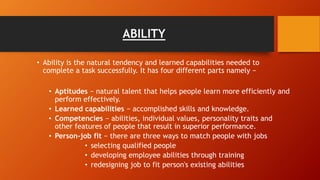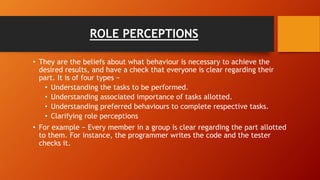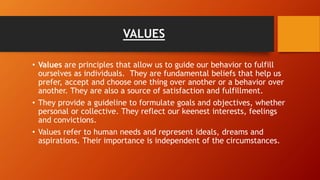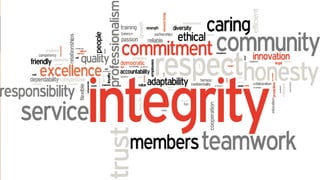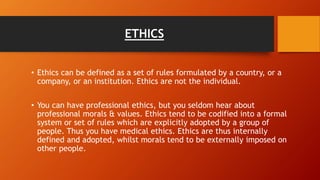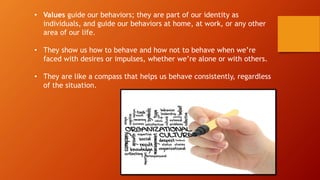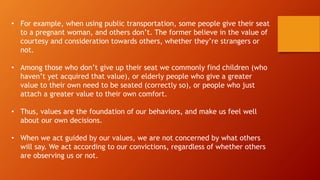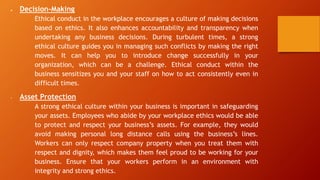MARS Model
- 1. MARS MODEL By: UNNATI GARG
- 2. INTRODUCTION • MARS model of individual behaviour is a model that seeks to elaborate individual behaviour as a result of internal and external factors or influences combined together. • The model can be implemented to a variety of situations, but is usually applied in Management, Industrial Psychology or Organizational Behaviour studies. • This model represents that these four factors have a mixed effect on individual performance. If any factor weakens, performance will decrease.
- 3. MARS is the acronym for : • MOTIVATION • ABILITY • ROLE PERCEPTION • SITUATIONAL FACTORS
- 5. MOTIVATION • Motivation can be described as internal forces that impact the direction, intensity, and endurance of a person’s voluntary choice of behaviour. It consists of − • Direction − focused by goals. • Intensity − bulk of effort allocated. • Persistence − amount of time taken for the effort to be exerted. • For example − A team leader encourages team members to work efficiently.
- 6. ABILITY • Ability is the natural tendency and learned capabilities needed to complete a task successfully. It has four different parts namely − • Aptitudes − natural talent that helps people learn more efficiently and perform effectively. • Learned capabilities − accomplished skills and knowledge. • Competencies − abilities, individual values, personality traits and other features of people that result in superior performance. • Person-job fit − there are three ways to match people with jobs • selecting qualified people • developing employee abilities through training • redesigning job to fit person's existing abilities
- 7. ROLE PERCEPTIONS • They are the beliefs about what behaviour is necessary to achieve the desired results, and have a check that everyone is clear regarding their part. It is of four types − • Understanding the tasks to be performed. • Understanding associated importance of tasks allotted. • Understanding preferred behaviours to complete respective tasks. • Clarifying role perceptions • For example − Every member in a group is clear regarding the part allotted to them. For instance, the programmer writes the code and the tester checks it.
- 8. SITUATIONAL FACTORS • They are the environmental conditions like given time bound, team members, budget, and work facilities that limits or facilitates behaviour. Factors that are beyond the individual’s control in the short run. • Some situational characteristics such as consumer preferences and economic conditions originate from the external environment and consequently are beyond the employee’s and organization control.
- 9. VALUES • Values are principles that allow us to guide our behavior to fulfill ourselves as individuals. They are fundamental beliefs that help us prefer, accept and choose one thing over another or a behavior over another. They are also a source of satisfaction and fulfillment. • They provide a guideline to formulate goals and objectives, whether personal or collective. They reflect our keenest interests, feelings and convictions. • Values refer to human needs and represent ideals, dreams and aspirations. Their importance is independent of the circumstances.
- 10. CORE VALUES
- 11. ETHICS • Ethics can be defined as a set of rules formulated by a country, or a company, or an institution. Ethics are not the individual. • You can have professional ethics, but you seldom hear about professional morals & values. Ethics tend to be codified into a formal system or set of rules which are explicitly adopted by a group of people. Thus you have medical ethics. Ethics are thus internally defined and adopted, whilst morals tend to be externally imposed on other people.
- 13. IMPACT OF VALUES AND ETHICS ON INDIVIDUAL BEHAVIOUR AND PERFORMANCE
- 14. • Values guide our behaviors; they are part of our identity as individuals, and guide our behaviors at home, at work, or any other area of our life. • They show us how to behave and how not to behave when we’re faced with desires or impulses, whether we’re alone or with others. • They are like a compass that helps us behave consistently, regardless of the situation.
- 15. • For example, when using public transportation, some people give their seat to a pregnant woman, and others don’t. The former believe in the value of courtesy and consideration towards others, whether they’re strangers or not. • Among those who don’t give up their seat we commonly find children (who haven’t yet acquired that value), or elderly people who give a greater value to their own need to be seated (correctly so), or people who just attach a greater value to their own comfort. • Thus, values are the foundation of our behaviors, and make us feel well about our own decisions. • When we act guided by our values, we are not concerned by what others will say. We act according to our convictions, regardless of whether others are observing us or not.
- 16. • When we truly believe that a set of behaviors constitute an essential cornerstone to life, we act accordingly, and don’t care what others say about it. • When are committed to being honest, we don’t take what isn’t ours. We do so because we believe in respecting the property of others, not because we are being watched. • Values guide our actions and determine for us what’s good or bad. When we’re guided by values, we act without expecting anything in return, except personal satisfaction and fulfillment.
- 17. The Ethics Resource Center reports that non-unionized employees perceive stronger ethical cultures within their organizations than their unionized counterparts. The non-profit organization also reports that young workers are more likely to perceive weak ethical cultures within their companies than older ones. Managers also tend to value stronger ethical cultures than employees in non-management positions. It is your duty as a manager to incorporate and manage a strong ethical culture within your business. Workplace ethics are significant to your business and provide numerous benefits.
- 18. Productivity and Teamwork Workplace ethics is integral in fostering increased productivity and teamwork among your employees. It helps in aligning the values of your business with those of your workers. Achieving this alignment requires that you encourage consistent dialogue regarding the values of your business, which enhances community, integrity and openness among employees. Ethics enable your workers to feel a strong alignment between their values and those of your business. They show such feelings through increased productivity and motivation. • Public Image You earn a lot of respect and cultivate a strong image in the public domain when you make ethical choices. For instance, you can fulfill your corporate social responsibility by reducing waste discharge from your business. The public would consider your business to be operating with honor and integrity while valuing people over profits. Building a strong public image through ethical conduct also earns you more clients. Customers would develop trust in you and do business with your organization.
- 19. Decision-Making Ethical conduct in the workplace encourages a culture of making decisions based on ethics. It also enhances accountability and transparency when undertaking any business decisions. During turbulent times, a strong ethical culture guides you in managing such conflicts by making the right moves. It can help you to introduce change successfully in your organization, which can be a challenge. Ethical conduct within the business sensitizes you and your staff on how to act consistently even in difficult times. • Asset Protection A strong ethical culture within your business is important in safeguarding your assets. Employees who abide by your workplace ethics would be able to protect and respect your business’s assets. For example, they would avoid making personal long distance calls using the business’s lines. Workers can only respect company property when you treat them with respect and dignity, which makes them feel proud to be working for your business. Ensure that your workers perform in an environment with integrity and strong ethics.






